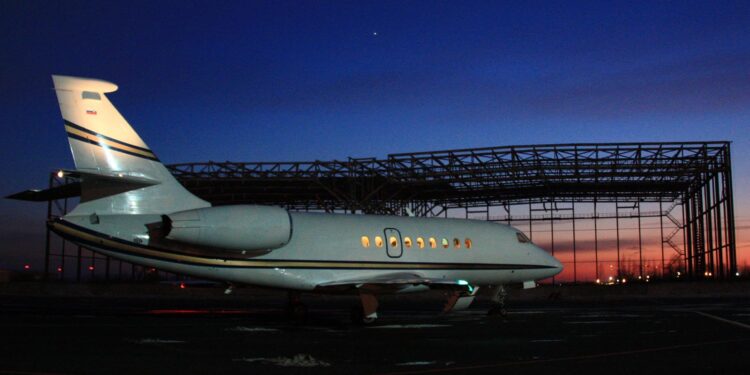Business Aviation Ops to St. Petersburg: Part 1 – Airport and CIQ

This business aviation blog post is part of a series on operations to St. Petersburg, Russia.
St. Petersburg (ULLI) is the only airport available for business aviation operations to St. Petersburg. While this is not a difficult location from an aircraft parking, landing permit, or service perspective, there may be issues to consider during major event periods.
The following is an overview of what you need to know when operating to St. Petersburg:
1. Primary airport is ULLI
ULLI is a 24-hour airport of entry accepting both General Aviation (GA) and scheduled commercial traffic. Scheduled commercial operations take priority in airport slot assignments. At this time there are no noise restrictions for ULLI; however, noise abatement procedures are in place 24 hours for all aircraft arrivals and departures. ULLI is approximately 11 miles southwest of the city, with a drive time of approximately 45 minutes, in normal driving conditions.
2. Permits, PPRs, and airport slots
Landing permits are required for all aircraft traveling to Russia. Lead time depends on number of seats and number of times an operator travels to Russia per month. For full information on Russian permits, please see our article entitled Coming Soon: Russian Landing Permit Changes – Effective May 30, 2013. Airport slots are valid +/- 5 minutes and should be requested as early as possible. Prior Permission Required (PPR) is needed for parking at ULLI. PPRs should be requested as soon as schedule is known. Landing fees and parking costs are relatively reasonable at this location and are calculated per metric ton. Daily parking charges are equivalent to the landing fee plus 15%. Be aware that no hangar space is currently available for transient GA aircraft at ULLI but should be available by winter of 2014. During winter you may need to plan additional time for de-icing, etc. If an aircraft needs to be relocated on the ramp, crew must always be present.
3. CIQ clearance
All arrival Customs, Immigration, and Quarantine (CIQ) clearance is accomplished at Terminal 2. On departure you’ll clear CIQ at Terminal 3. There are separate lines for immigration and customs, with typical clearance time of about 15 minutes. There’s a terminal usage fee for both passengers and crew. With prior arrangement your ground handler will take care of these charges and bill you at a later time. CIQ clearance on or near your aircraft may be possible on a case-by-case basis, which depends on the status of your passengers and purpose of your flight. If onboard clearance is desired, it’s best to request this at least a few days in advance. Also, please note that even for a tech stop, visas are required for all crew onboard.
4. CIQ considerations for tech stops
When you make tech stops in Russia, depending upon the airport, it’s possible that you may need to clear CIQ. For this reason it’s best to confirm in advance such requirements, with your 3rd-party provider or ground handler. To avoid issues when making tech stops in Russia, passengers/crew members should have valid Russian visas.
5. Visas and documentation
Note that visas are required prior to arrival for all passengers and crew. Visas can not be arranged on arrival, and, without a required visa, you’ll be denied entry or even jailed – at discretion of airport authorities. Completed arrival/departure cards are required for all passengers/crew members. Your ground handler can pre-fill out these cards, assuming all information has been forwarded in advance. Always ensure you have all required aircraft documentation onboard in case of a ramp check. It’s recommended also to have copies of your flight plan on hand, along with a weight and balance sheet signed by the captain.
6. Agricultural restrictions
Onboard catering is often permitted to be brought into the country, so long as it’s sealed in original packaging and in quantities for personal use. It may be possible to store certain catering items at the airport, but always confirm this in advance with your ground handler. There are, however, certain restrictions to consider:
- Only 250 grams of caviar per person may be brought into Russia.
- Alcoholic beverages are limited to 2 liters per person.
- Dairy and meat products from Armenia and Georgia are restricted.
It’s best to check in advance regarding any items you may wish to bring into Russia in case the items are banned or restricted.
7. Pet and gun restrictions
Onboard pets must have either a current vet health certificate or, in the case of Commonwealth of Independent States (CIS) countries, a veterinary license. These documents must have been issued within 10 days of your arrival and signed by the vet. Traveling birds must have certificates confirming they do not have bird flu. For all animals, other than dogs and cats, you’ll be required to present a pet passport. In order to bring guns into Russia, you must have proof of ownership for each weapon, along with prior approval to import the item. A local hunting outfitter will be able to assist in ensuring that correct permits have been obtained. Military-style arms and ammunition are not permitted to be brought into Russia.
Conclusion
CIQ clearance at ULLI is straightforward and seldom problematic. Still, it’s important to double-check visa and documentation requirements in advance with your 3rd-party provider or local ground handler to avoid day-of-operation issues.
Questions?
If you have any questions about this article or would like assistance planning your next trip to Russia, contact me at abelperez@univ-wea.com.
Stay tuned for Part 2, which covers more information on aircraft parking, services, and security when traveling to St. Petersburg, Russia.




